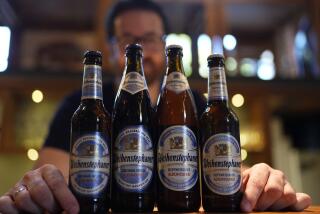Investors Souring on Actions of China’s Tsingtao Beer Managers : Stocks: Amid lower profits, brewery officials have decided to retool. Overseas fund managers wonder why they weren’t told of the strategy.
- Share via
QINGDAO, China — The fizz has gone out of Tsingtao, China’s world-famous beer.
Just two years ago China’s largest beer maker, Tsingtao Brewery, was the toast of overseas investors when it led a parade of Chinese companies onto the Hong Kong stock market, raising HK$890 million ($114 million) in a public offering.
But now Tsingtao and its foreign stockholders are at loggerheads.
This year the company announced that 1994 profits had plummeted 42%, management ripped up its business plan and overseas fund managers have been asking, “What’s happened to the money from the listing?”
Tsingtao shares were suspended for a day in Hong Kong last month after media reports that the company had lent out the stock proceeds and was low on cash.
“They’ve gone from a brewery to a loan-sharking operation,” said the Shanghai-based manager of a leading European brokerage.
Tsingtao officials insist the loans have been safely returned and seem surprised by the fuss.
“They don’t understand our business,” said Yuan Lu, vice director of Tsingtao’s Securities Department, shrugging off comments by hostile brokerage analysts who have lately rated Tsingtao a “sell.”
Much of the problem boils down to disclosure.
After more than four decades answering to state bureaucrats, Tsingtao is having trouble with its new reporting lines to the financial markets.
Most analysts had expected healthy earnings growth. They were taken aback when Tsingtao unveiled a five-year strategy that called for major investments in new plants instead of steady expansion of existing facilities.
At the very least, Hong Kong-based fund managers thought they should have been warned: The new blueprint makes nonsense of their forecasts.
“We haven’t broken any of the regulations of the Hong Kong Stock Exchange,” Yuan said. She added: “There’s no way we can disclose decisions before they’ve been made.”
Maybe so. The problem is that Tsingtao, founded by German settlers in the last century, is no longer the same company in which investors put their money.
In its listing prospectus, Tsingtao promised production capacity of 700,000 metric tons of beer by the end of this year.
Instead, the latest plan calls for 1995 output of barely half that amount, but promises 1.4 million metric tons by 2000. To achieve that, the company will spend 5 billion yuan ($595 million) building new plants around China.
Tsingtao is discussing a joint-venture with U.S. brewing giant Anheuser-Busch Cos. Inc..
But as those talks drag on, big multinational brewers, including Anheuser-Busch, are quickly signing deals with other Chinese companies to get a foothold in the world’s fastest-growing beer market, where foreign brands are more popular than local ones. By the time Tsingtao opens the taps at its new breweries, foreign beer will be gushing in some of Tsingtao’s most important domestic markets.
Then there’s the problem of financing its spending.
Tsingtao has 700 million yuan ($83 million) left in the bank. Foreign partners may put up some capital, but Tsingtao will have to borrow the rest from banks, no easy task for a company whose margins are being squeezed by rising packaging and raw-material costs.
More to Read
Inside the business of entertainment
The Wide Shot brings you news, analysis and insights on everything from streaming wars to production — and what it all means for the future.
You may occasionally receive promotional content from the Los Angeles Times.









